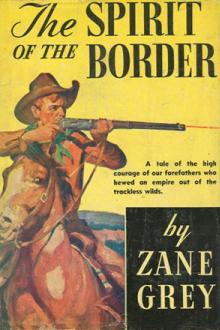The U. P. Trail, Zane Grey [robert munsch read aloud .txt] 📗

- Author: Zane Grey
Book online «The U. P. Trail, Zane Grey [robert munsch read aloud .txt] 📗». Author Zane Grey
“Neale, you can’t prove anything,” sneered Coffee. “If you have any sense you’ll shut up. I tell you this is only a LITTLE deal. I’m on the inside. I know financiers, commissioners, Congressmen, and Senators—and I told you before the directors are all in on this U. P. R. pickings. You’re a fool!”
“Maybe. But I’m no thief,” retorted Neale.
“Shut up, will you?” shouted Coffee, who plainly did not take kindly to that epithet before the gathering crowd. “I’m no thief... Men get shot out here for saying less than that.”
Neale laughed. He read Coffee’s mind. That worthy, responding to the wildness of the time and place, meant to cover his tracks one way or another. And Neale had not lived long with Larry Red King for nothing.
“Coffee, you ARE a thief,” declared Neale, striding forward. “The worst kind. Because you stole without risk. You can’t be punished. But I’ll carry this deal higher than you.” And quick as a flash Neale snatched some telegrams from Coffee’s vest pocket. The act infuriated Coffee. His face went purple.
“Hand ‘em back!” he yelled, his arm swinging back to his hip.
“I’ll bet there’s a telegram here from Lee, and I’m entitled to keep it,” responded Neale, coolly and slowly.
Then as Coffee furiously jammed his hand back for his gun Neale struck him. Coffee fell with the overturned table out in the sand. His gun dropped as he dropped. Neale was there light and quick. He snatched up the gun.
“Coffee, you and Blake are to understand you’re fired,” said Neale. “Fired off the job and out of camp, just as you are.”
Fifteen days later the work-train crossed Number Ten on a trestle and the construction progressed with new impetus.
Not many days later a train of different character crept slowly foot by foot over that temporary bridge. It carried passenger-coaches, a private car containing the directors of the railroad, and General Lodge’s special car. The engine was decorated with flags and the engineer whistled a piercing blast as he rolled out upon the structure. Number Ten had been the last big obstacle.
As fortune would have it, Neale happened on the moment to be standing in a significant and thrilling position, for himself and for all who saw him. And that happened to be in the middle of the stream opposite the trestle on the masonry of the middle pier, now two feet above the coffer-dam. He was as wet and muddy as the laborers with him.
Engineer, fireman, brakemen, and passengers cheered him. For Neale the moment was unexpected and simply heart-swelling. Never in his life had he felt so proud. And yet, stinging among these sudden sweet emotions was a nameless pang.
Presently Neale espied General Lodge leaning out of a window of his car. He was waving. Neale pointed down at his feet, at the solid masonry; and then, circling his mouth with his hands, he yelled with all his might:
“Bed-rock!”
His chief yelled back, “You’re a soldier!”
That perhaps in the excitement and joy of the moment was the greatest praise the army officer could render. Nothing could have pleased Neale more.
The train passed over the trestle and on out of sight. Upon its return, about the middle of the afternoon, it stopped in camp. A messenger came with word for Neale to report at once to the directors. He hurried to his tent to secure his papers, and then, wet and muddy, he entered the private car of the directors.
It contained only four men—General Lodge, and Warburton, Rogers, and Rudd. All except the tall, white-haired Warburton were comfortable in shirt-sleeves, smoking with a table between them. The instant Neale entered their presence he divined that he faced a big moment in his life.
The chiefs manner, like Larry King’s when there was something in the wind, seemed quiet, easy, potential. His searching glance held warmth and a gleam that thrilled Neale. But he was ceremonious, not permitting himself his old familiarity before these dignitaries of the great railroad.
“Gentlemen, you remember Mr. Neale,” said Lodge.
They were cordial—pleasant.
Warburton vigorously shook Neale’s hand, and leaned back, after the manner of matured men, to look Neale over.
“Young man, I’m glad to meet you again,” he declared, in his big voice. “Remember him! Well, I do—though he’s thinner, older.”
“Small wonder,” interposed the chief. “He’s been doing a man’s work.”
“Neale, back there in Omaha you got sore—you quit us,” went on Warburton, reprovingly. “That was bad business. I cottoned to you—and I might have—But no matter. You’re with us again.”
“Mr. Warburton, I’m ashamed of that,” replied Neale, hastily. “But I was hot-headed... am so still, I fear.”
“So am I. So is Lodge. So is any man worth a damn,” replied the director.
“Mr. Neale, you look cool enough now,” observed Rogers, smiling. “Wish I was as wet and cool as you are. It’s hot—in this desert.”
Warburton took off his frock-coat. “You gentlemen aren’t going to have any the best of me... And now, Neale, tell us things.”
Neale looked at his papers and then at his chief. “For instance,” said Lodge, “tell us about Blake and Coffee.”
“Haven’t you seen them—heard from them?” inquired Neale.
“No. Henney has not, either. And they were his men.”
“Gentlemen, I’m afraid I lost my head in regard to them.”
“Explain, please,” said Warburton. “We will judge your conduct.”
It was a rather difficult moment for Neale, because his actions regarding the two engineers now appeared to have been the result of violent temper, rather than a dignified exercise of authority. But then as he remembered Blake’s offer and Coffee’s threat the heat thrilled along his nerves; and that stirred him to forceful expression.
“I drove them both out of this camp.”
“Why?” queried Warburton, sharply.
“Blake tried to bribe me, and Coffee—”
“One at a time,” interrupted Warburton, and he thrust a strong hand through his hair, ruffling it. He began to scent battle. “What did Blake try to bribe you to do?”
“He didn’t say. But he meant me to cover their tracks.”
“So!... And what did Coffee do?”
“He tried to pull a gun on me.”
“Why? Be explicit, please.”
“Well, he threatened me. And I laughed at him—called





Comments (0)